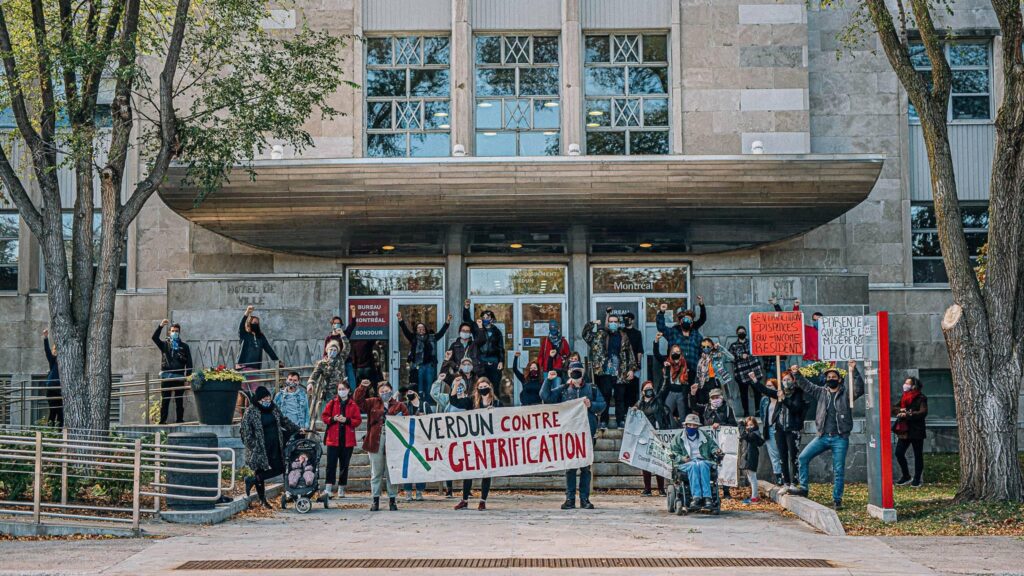On the last day of the parliamentary session, the Quebec government introduced a bill to restrict tenants' rights under the Civil Code of Quebec. Among other things, Bill 31 aims to prevent the transfer of leases, the only tool that gives tenants some autonomy from their landlords. The Regroupement des comités de logement et associations de locataires du Québec (RCLALQ) has described the bill as a "major step backwards for tenants' rights".
Lease transfers are the transfer of a tenancy contract to another tenant, who retains the same conditions, including the cost of rent. Lyn, from the Citizen Action Committee of Verdun (CACV) explains that "technically, it is always possible to transfer a lease, but the risk is such that you could just as easily cancel it." The new law gives the landlord the right to unilaterally refuse the transfer and terminate the applicant's lease on the spot. "Would I hand my landlord this time bomb? Probably not."
With the housing shortage, landlords are becoming increasingly pontious when choosing their tenants, demanding credit checks, reference checks or even a first month's rent deposit on signing. Some take discrimination a step further and refuse to rent their flats to families, immigrants, students or people without employment references.

Lyn from the CACV adds that "for people who are discriminated against when looking for a flat, transferring their lease is a good way of getting round this problem". She expects to see a significant increase in requests for assistance from the CACV in cases of discrimination.
France-Élaine Duranceau, Quebec's minister of housing, has refused to meet with tenants committees since taking office in autumn 2022. However, she has met with Martin Messier, president of the Association des propriétaires du Québec (APQ), on at least ten occasions. Among other things, he has lobbied the Minister to "defend the interests of landlords", which implies a "complete revision of the law governing the Administrative Rental Tribunal", according to information available on Carrefour Lobby Québec.
The section of Bill 31 dealing with lease transfers is almost identical to the subject of another lobbying mandate obtained by Mr Messier. This was obtained in 2015 and allows the President of the APQ to ask the Minister to amend the Civil Code of Québec to enable the landlord to terminate the applicant's lease and refuse the transfer.
This closeness between the Minister and real estate speculators is all the more apparent given that Ms Duranceau herself owns assets in the real estate market. She is a director of five companies that exploit rental housing for profit. In addition, she is a beneficiary of more than $10,000 in three real estate trusts.
Minister Duranceau is a business partner with Annie Lemieux. The two women manage real estate companies together. Annie Lemieux also has a mandate to lobby the ministry, and she and Ms Duranceau are long-standing friends.
According to the RCLALQ, a large proportion of major rent increases occur when tenants change. It is impossible to know what the previous tenant was paying if the landlord does not indicate it on the lease. So lease transfers are one way of avoiding these abusive increases. "Rents have skyrocketed in Quebec in recent years, and rather than taking action to curb this escalation, this bill adds fuel to the fire," says Cédric Dussault, co-spokesman for the RCLALQ.
The Tribunal administratif du logement (TAL, the Housing tribunal) rarely examines rent increases. Only 5% of TAL hearings are devoted to setting rents. In total, only 0.5% of rent increases are examined by the TAL. The percentages of rent increases proposed by the TAL are indicative only. Landlords can therefore increase rents almost with impunity, with the complicity of the Minister for Housing.
- CAPREIT extracts as much money as possible from their tenants
- A Law Written for and by Landlords
- The Legault Government Launches an Attack on Tenants
- A Campaign for a Moratorium on Evictions
- When Politics and Business Violate Tenants’ rights
- Real estate developers reinforce shortage by reducing housing starts
- What effects will the adoption of Québec’s Bill 31 have?
- Housing bill continues to be denounced by unions and housing groups
- Conflict of interest for Quebec’s tenant-landlord tribunal?
- One year later, tenants still standing up to excessive rent increases
- Developers paying pennies to bypass affordable housing requirements in Montréal
- Build, but at what cost to tenants?
- A First Victory for Quebec Tenants Against the CAQ
- “Montreal attacks the homeless instead of homelessness”


